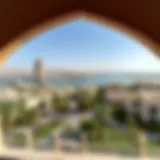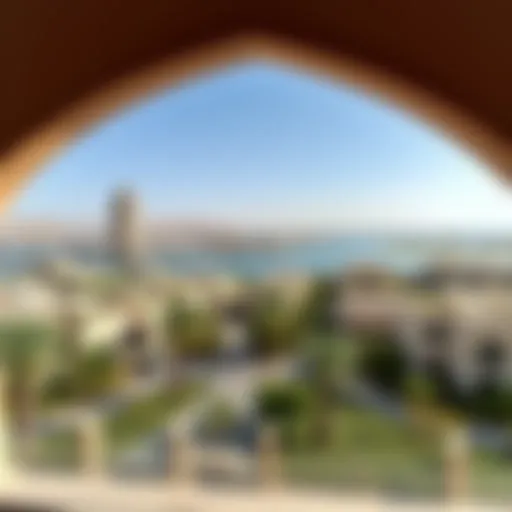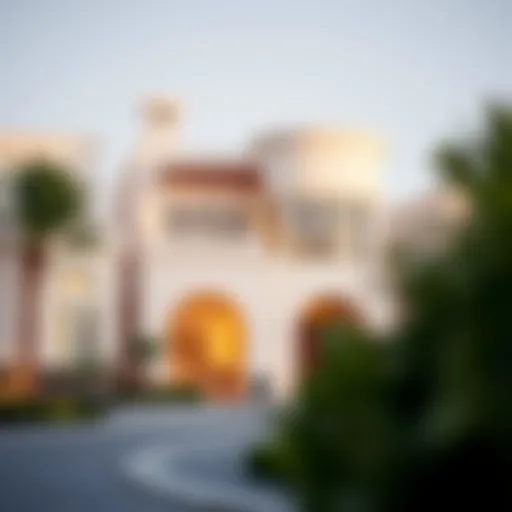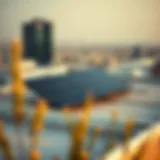Exploring Dubai's PG Market: Trends and Insights


Intro
The property group (PG) market in Dubai has become a topic of notable interest for a diverse set of stakeholders—from seasoned investors to first-time homebuyers. In recent years, this market has seen significant fluctuations, influenced by a range of factors such as shifting demographics, economic policies, and international investment trends. Gaining insights into these shifts can better equip potential stakeholders to make informed decisions.
Dubai isn’t just a city; it's a hub of innovation and development, constantly evolving to meet the needs of both local residents and foreign investors. The unique characteristics of this market can lead to both lucrative opportunities and considerable challenges. Understanding these dynamics is no small feat, but it’s essential for anyone looking to navigate the property waters in Dubai effectively.
This article aims to break down the complexities of the PG market into digestible insights. We will explore current trends, dive deep into various property types, and discuss the crucial aspect of regulations affecting the sector. Let’s step into the heart of Dubai’s real estate landscape.
Overview of the PG Market in Dubai
The property group (PG) market in Dubai is a dynamic realm, intertwining diverse opportunities and complexities that greatly impact potential investors and homebuyers alike. Understanding this market is not just about dwelling on numbers; it’s about grasping the pulsating heart of a city that never sleeps. By exploring the nuances of the PG market, one can navigate through its maze of offerings, ensuring informed and strategic decisions.
Definition and Scope of PG
In the context of Dubai, a property group typically refers to a collection of properties managed under a single entity. This can encompass a variety of property types, from residential apartment complexes to commercial office spaces. It is crucial to note that the scope of PG extends beyond mere property management—it's about creating a community or lifestyle that caters to the needs of tenants and investors alike. The role of PGs can range from facilitating long-term rentals to providing short-term lease options for expatriates and tourists, making them an instrumental player in the real estate landscape.
Historical Context
The evolution of the PG market in Dubai is a fascinating tale, reflecting the city's broader economic shifts. Initially, the market was characterized by sporadic growth, primarily during the late 1990s. The real boom, however, came in the early 2000s with the liberalization of property laws, which allowed foreign ownership and significantly attracted international investors.
As the skyline changed, so did the demands of its inhabitants. High-rise apartment buildings began to sprout like mushrooms after a rainy day, with developers rushing to meet the demands of a diverse population. What was once a predominantly national market transformed into a melting pot of cultures and ambitions. The trend towards luxurious living spaces shaped the PG landscape considerably, leading to the establishment of high-end property groups that catered to unique lifestyle preferences.
In recent years, economic fluctuations and regulatory changes have posed challenges, but they have also prompted innovation within the sector. Investors today look for sustainability, leveraging modern technology to enhance property management and tenant experiences. The evolution of the market has not just been about growth, but adaptation—an essential quality for stakeholders aiming to thrive in Dubai's PG sector.
Current Trends in the PG Sector
The PG market in Dubai is not simply a reflection of real estate; it embodies the evolution of lifestyles and economic shifts within one of the world's most dynamic cities. For investors and homeowners alike, recognizing current trends is essential for making informed decisions. With the rapid pace of change in this sector, being attuned to these developments can provide a significant advantage.
Residential vs. Commercial PGs
In the conversation surrounding PGs, one of the most critical distinctions lies between residential and commercial properties. Residential PGs typically cater to individuals and families seeking comfortable, short-term housing solutions, often emphasizing community and amenities.
- Residential PGs are sprouting up in areas populated by young professionals or students. Properties in these sectors tend to focus on shared living arrangements, often including additional services like housekeeping or laundry. Think of them as a bridge between traditional apartments and hotel facilities, offering flexibility and social interaction.
- Commercial PGs, on the other hand, center on business needs. These often provide short-term accommodation for employees or affiliated personnel in sectors like finance, technology, and hospitality. The design and functionality are aimed at supporting a work-focused lifestyle, complete with meeting rooms and networking spaces.
Understanding these distinctions enables potential investors to align their purchases with market demands. With the growing number of expatriates and tourists, both types of PGs can yield lucrative returns, each requiring different approaches to management and marketing.
"Investors should focus on understanding their target audience, whether they are catering to families, young professionals, or business travelers to maximize returns."
Emerging Neighborhoods
Dubai is a city of neighborhoods, each radiating its own charm and appeal. Certain areas have seen surges in demand for PGs due to urban development and changing demographics. Here are some neighborhoods that stand out:
- Dubai Marina: This vibrant waterfront area continuously attracts investors due to its blend of leisure, business, and lifestyle opportunities. With a mix of residential and commercial PGs, this locale holds broad appeal.
- Downtown Dubai: Home to iconic landmarks, this area serves as both a cultural hub and a business district, making it attractive for high-end PG developments targeting both long-term residents and tourists alike.
- Jumeirah Village Circle (JVC): A developing area with more affordable housing options, JVC is receiving significant attention from those looking for balance between comfort and affordability. This neighborhood is expanding rapidly, making it a hotspot for residential PG offerings.
Recognizing these areas can inform investment strategy, leading to more substantial opportunities and portfolio diversification. As trends shift and new neighborhoods flourish, the PG landscape will likely grow in complexity, inviting both challenges and opportunities for those involved.
In essence, current trends in the PG sector shine a light on the intricate tapestry of Dubai's real estate market. These insights can serve as the bedrock for strategic decision-making, informing potential investors and homeowners about where to plant their stakes.
Investment Opportunities in PGs
The property group (PG) market in Dubai presents a plethora of investment opportunities that savvy investors can tap into. Understanding these opportunities is crucial for those looking to make informed decisions in this rapidly evolving landscape. With increasing demand for PG accommodations driven by a growing expatriate population and diverse clientele, the potential for profit becomes apparent. Investing in PGs offers not only the possibility of significant returns on investment (ROI) but also various other benefits that one should consider carefully.
ROI Considerations
When delving into the investment opportunities within the PG market, assessing return on investment is of paramount importance. Investors need to look beyond initial costs and focus on the potential long-term benefits. Here are a few considerations to keep in mind:
- Tenant Demand: In Dubai, where the workforce is largely comprised of expatriates, there is a consistent demand for quality PG facilities. Areas like Dubai Marina and Downtown are hotspots where occupancy rates remain high, ensuring stable cash flow.
- Rental Yields: The rental yields in Dubai are comparatively favorable. Investors can expect yields ranging from 7% to 10%, depending on the location and amenities offered. Understanding these figures helps in making projections about the financial viability of the investment.
- Market Trends: Keeping an ear to the ground regarding market trends is essential. Investors need to monitor shifts in demand, such as the rise of affordable housing options, which can impact occupancy rates and pricing strategies.
"Investing in PGs is akin to riding a wave; understanding the currents of demand and trends ensures you don’t wipe out."
Long-term vs. Short-term Investments
When it comes to PG investments, one cannot simply lump all strategies into a single basket. The choice between long-term and short-term investment approaches involves understanding the investor’s financial goals and market conditions. Here’s how each strategy stacks up:
- Short-term Investments: Focused on quick turnover, short-term investments—like seasonal rentals—can yield immediate cash flow. This strategy is advantageous for investors seeking quick profits or to capitalize on temporary market booms. However, it also comes with heightened risks, such as fluctuating demand.
- Long-term Investments: Opting for a long-term investment strategy tends to be more stable, allowing for consistent income flow over time. This approach allows investors to build equity gradually and weather market downturns more effectively. The key lies in selecting well-located PGs with sustained demand to ensure continuous profitability.
- Hybrid Approach: Some investors may find a mix of both strategies sufficient. By diversifying their portfolio, they might engage in short-term rentals while maintaining long-term properties, thus balancing the risks and rewards.
Ultimately, whether a short-term or long-term investment approach is right depends on individual goals, market dynamics, and the investor's capacity to adapt to changing circumstances. Careful consideration and analysis are crucial in defining the investment style that aligns best with one's aspirations.
Understanding Regulatory Framework
In the complex tapestry of Dubai's property group (PG) market, the regulatory framework serves as the backbone, shaping the opportunities and limitations for investors, developers, and homeowners alike. Understanding these regulations is not merely an academic exercise; it's crucial for anyone looking to navigate this lucrative but challenging landscape. The significance of a well-defined regulatory environment lies in promoting transparency, protecting stakeholder interests, and ensuring sustainable growth in the sector. Regulations offer a structure that enables sound investment decisions, driving investors to engage confidently in the market.
The unique characteristics of Dubai's PG market have led to a regulatory approach that is tailored to its diverse demographic and economic fabric. As such, stakeholders must stay abreast of the key regulations that govern their endeavors in this vibrant city. In the following subsections, we will explore the critical regulations affecting PGs and the impact of recent legal changes shaping the future of property investment in Dubai.
Key Regulations Affecting PGs
Navigating the regulatory landscape in Dubai's PG market entails understanding several key regulations that play pivotal roles:


- Real Estate Regulatory Agency (RERA): Established to oversee real estate transactions, RERA formulates regulations that govern the conduct of real estate activities, ensuring fairness and transparency.
- Strata Law: This regulation governs the management and operation of multi-unit developments, including extensive provisions on the rights and responsibilities of owners and tenants.
- Tenancy Laws: These laws outline the rights and obligations of landlords and tenants, providing important guidelines for rental rates and eviction processes.
- Property Ownership Laws for Foreigners: Different regulations apply when foreign nationals look to invest in PGs. Understanding these restrictions and guidelines can be a game-changer for investors seeking opportunities beyond their home countries.
- Freehold vs. Leasehold Ownership: This distinction is essential for investors to comprehend, influencing property rights and investment strategies.
Being well-versed in these regulations can mean the difference between a successful investment and a potential pitfall. They govern everything from the rights of the property owners to how disputes are settled, shaping the overall investment climate.
Impact of Recent Legal Changes
While the legal framework in Dubai provides a solid foundation for property transactions, recent changes signal a shift aimed at enhancing investor confidence. These adaptations reflect the government's recognition of evolving market dynamics and the need for a responsive regulatory environment. Key changes seen recently include:
- Streamlined Approval Processes: To promote investment, regulators have simplified processes for obtaining licenses and permits, reducing bureaucratic hurdles that historically slowed down projects.
- Enhanced Consumer Protection: New measures have been introduced to better protect buyers, ensuring that off-plan properties are delivered on time and in accordance with promised specifications. This can establish instant trust between buyers and sellers.
- Flexible Ownership Structures: Recent legal updates have permitted more diverse ownership models, making it easier for mixed-use developments, which can attract a broader audience.
"Regulations are not just rules; they are the framework that defines what is possible in a market. In Dubai, they are evolving constantly to keep pace with global trends and local needs."
By understanding these recent changes, investors can position themselves strategically in the market, adapting accordingly to maximize both profitability and compliance. With the landscape continuously shifting, staying informed of regulatory developments is critical for maintaining a competitive edge.
Financing Options for PGs
In the ever-evolving terrain of Dubai’s property group (PG) market, understanding financing options becomes crucial for stakeholders. Whether you are a potential investor eyeing a property, a homebuyer scoping out opportunities, or a developer looking into project viability, recognizing how to manage finances effectively can make or break a deal. Given the competitive nature of this market, diving headfirst into various financing avenues presents not just benefits, but also necessary considerations for informed decision-making.
Traditional Financing Methods
When it comes to financing options, traditional methods still hold their ground. Mortgages provided by local banks, for instance, have been a cornerstone for many prospective homeowners and investors. These typically come with fixed or variable interest rates and are contingent upon a one-to-one assessment of property valuation and the borrower's financial standing.
Some key aspects of traditional financing include:
- Bank Loans: Many banks in Dubai, like Emirates NBD or Abu Dhabi Commercial Bank, offer specialized mortgage products for PG purchases. They often require a down payment, usually around 20%.
- Tenor Flexibility: Most banks provide loans with variable tenures, ranging from 5 to 30 years, allowing buyers to choose a payment plan that fits their financial situation.
- Secure Investment: For lenders, these loans are backed by the property itself, thus presenting lower risks compared to unsecured loans.
Nevertheless, borrowers should keep a couple of things in mind:
- Credit History: A solid credit history in Dubai can lead to more favorable terms, but a poor credit score can complicate matters.
- Debt-to-Income Ratio: Lenders closely scrutinize this figure to assess if a borrower can comfortably service their debt.
Innovative Financing Solutions
As the world rapidly adapts to new technologies, so too does the PG financing landscape. Innovative financing solutions have emerged to address many of the challenges posed by traditional methods. These approaches are often more flexible, catering not just to large investors but also to new entrants in the market who might lack conventional collateral.
Some notable innovative financing options include:
- Crowdfunding: Platforms such as Property Finder or SmartCrowd allow multiple investors to pool resources to finance property acquisitions. This means that being a property investor is no longer reserved just for those with deep pockets.
- Tokenization: The concept of breaking down a property into digital tokens represents a pioneering way to invest in real estate. This way, investors can own small fractions of a property, significantly lowering barriers to entry.
- Fintech Solutions: Various fintech companies are providing diverse funding avenues, including peer-to-peer lending. These platforms often feature faster processes and varying criteria compared to traditional banks.
"Innovative financing options lower the barrier to entry in the PG market, making it accessible for a broader audience."
Overall, regardless of whether one gravitates towards traditional or innovative financing methods, it's essential to carry out thorough due diligence. Each method carries its own set of risks and advantages. Ultimately, by aligning one's goals with the appropriate financing option, stakeholders can navigate the complex landscape of the Dubai PG market with greater ease.
Market Challenges and Risks
Navigating the property group (PG) market in Dubai is akin to walking a tightrope; the stakes can be high, but so can the rewards. Understanding the challenges and risks in this sector is not merely beneficial—it’s essential. Any investor, homebuyer, or developer engaged in this vibrant marketplace must be aware of economic fluctuations and market saturation, as they could have impacts that resonate deeply through profit margins. Without a solid grasp of these elements, one could face serious setbacks.
Economic Factors Influencing the Market
The backbone of any thriving market is, undoubtedly, its economic foundation. In Dubai's PG sector, several economic factors come into play that can either boost or impede growth. Among these factors are fluctuating oil prices, which traditionally play a significant role in the UAE's economy. When oil prices dip, spending tends to contract, and so does demand for PG accommodations. Furthermore, the global economy's health—be it recession fears or economic booms—can affect foreign investment, which is crucial for Dubai’s real estate market.
Other economic indicators such as inflation rates, interest rates, and employment statistics must be observed diligently. For instance, when interest rates rise, financing costs for buyers increase, potentially leading to reduced purchases. An overall decline in job security in the region could trickle down to fewer people moving into PGs, thus affecting occupancy rates. Therefore, to navigate the PG market successfully, one must keep an eye on economic trends, interpreting how these elements could shift the demand dynamics at any given moment.
Market Saturation Concerns
As the city of Dubai continues to grow, many areas see a burgeoning influx of PG developments, leading to a legitimate worry of market saturation. While having a variety of options is typically advantageous for consumers, an oversupply can lead to significant consequences. When the market is flooded with PGs, competition amongst landlords and developers intensifies, often driving down rental prices. This situation can be especially perilous for investors who have entered the market without clear strategies in mind, as profits may dwindle beneath what was initially projected.
Moreover, market saturation can diminish the quality of services offered in PGs, as providers compete on prices rather than value. The consumer's experience may downgrade, leading to potential reputational damage for certain properties. Therefore, stakeholders in Dubai’s PG market need to evaluate not just the sheer volume of available accommodations but also the quality and uniqueness they can offer to stand out in an oversaturated field.
Understanding these market challenges and risks is akin to having a compass in uncharted waters—it's essential for steering clear of potential pitfalls.
In-depth Analysis of Popular PG Neighborhoods
Analyzing the popular neighborhoods in Dubai provides invaluable insights for investors and homebuyers alike. Understanding these areas means recognizing the unique features that contribute to the desirability and market potential of property group (PG) options. Each neighborhood has its own vibe, amenities, and demographic profile which play crucial roles in influencing property values and rental yields. A well-informed buyer or investor will identify which neighborhood aligns with their vision and needs, ensuring a wise investment.
Dubai Marina
Dubai Marina remains a dazzling jewel in the crown of the city's real estate sector. Known for its spectacular skyscrapers and waterfront living, this area draws both expatriates and tourists. The connectivity to business hubs via the Dubai Metro enhances its appeal, making it a hot spot for young professionals.
Some key features of Dubai Marina include:
- Lifestyle Amenities: The area boasts a vibrant life with cafes, restaurants, and retail therapy options right at the marina. Its stunning beach and picturesque views are nothing short of a postcard.
- Investment Potential: Investors can expect good returns due to high demand for short-term rentals, especially during peak tourist seasons.
- Community-oriented Vibe: It's very much a social hub, ideal for those who enjoy mingling and community events.
Overall, Dubai Marina's reputation for luxury living, combined with substantial amenities, places it at the top of the list for PG investments.
Downtown Dubai
Stepping into Downtown Dubai is like walking into a dreamland known worldwide for housing the iconic Burj Khalifa. The skyline here captivates the imaginations of many, yet it’s not just about aesthetics. The location is crucial, positioning residents in the heart of Dubai's commercial activities.
- Cultural Epicenter: Being home to numerous art galleries and theaters, it provides residents with endless cultural enrichment opportunities.
- Shopping Galore: One can’t overlook The Dubai Mall, a shopping mecca that further propels the area's desirability.
- Market Stability: The high-profile nature of Downtown Dubai leads to steady property prices, making it a safer choice for long-term investments.


In summary, Downtown Dubai rides the wave of both luxury and functionality, creating a prime spot for investors looking for sustainable returns.
Jumeirah Village Circle
On the rise, Jumeirah Village Circle (JVC) offers a different slice of lifestyle compared to its glitzy counterparts. It attracts families and those looking for more affordable, spacious residences without compromising proximity to city life.
Highlights of JVC are:
- Family-Friendly Environment: This neighborhood emphasizes community living with parks, schools, and recreational facilities designed for families.
- Value for Money: Real estate prices here are generally lower compared to more established areas, making it an attractive option for first-time buyers.
- Emerging Market: As new developments continue to be erected, JVC is fast becoming a sought-after place for real estate investors looking to capture growth.
Thus, Jumeirah Village Circle represents an exciting opportunity for those willing to invest in the next hot neighborhood while enjoying considerable lifestyle benefits.
?> "Understanding neighborhood dynamics is key in shaping investment strategies."
Each of these neighborhoods reveals distinct characteristics, inviting potential homeowners and investors to identify which aligns most closely with their objectives. If you’re weighing your options in the PG market, these three locales merit careful consideration.
Role of Technology in the PG Market
The integration of technology into the property group (PG) market in Dubai has become a game changer, reshaping how investors, developers, and consumers interact with real estate. As the urban landscape evolves, the reliance on technology is no longer a luxury; rather, it's a necessity to remain competitive in a bustling market. The technology-driven strategies not only enhance customer experience but also improve operational efficiency, making it crucial for stakeholders to adopt and embrace these innovations.
Proptech Innovations
Proptech, or property technology, refers to the use of technology to streamline, market, and manage real estate operations. In Dubai, several innovations have emerged, revolutionizing the sector in various ways:
- Virtual Tours: With the advent of virtual and augmented reality, potential tenants can now tour properties without physically stepping foot inside. This capability not only saves time but also widens the audience, enabling international clients and expatriates to examine properties from afar.
- Blockchain Technology: This is gaining traction, particularly for real estate transactions, ensuring greater security, transparency, and efficiency. By eliminating intermediaries, blockchain reduces costs associated with property sales and leases, fostering a more direct connection between buyers and sellers.
- Automated Property Management: Technology platforms now offer automated solutions for managing properties, including tenant screening, lease agreements, and maintenance requests. This significantly reduces operational burdens for property managers and allows them to focus on more strategic tasks.
In summary, these proptech innovations not only boost efficiency but also enhance the overall experience for all parties involved.
Data-Driven Decision Making
The role of data in the PG market cannot be overstated. Data-driven decision making involves leveraging analytics to inform business strategies and operational processes. Here are some key aspects of data utilization in this context:
- Market Analysis: By analyzing consumer behavior and market trends, investors can make informed decisions about where to allocate resources. For instance, data regarding rental yields, vacancy rates, and demographic shifts can guide investment strategies by highlighting lucrative opportunities.
- Predictive Analytics: Machine learning algorithms can predict future market trends based on historical data. Investors can forecast property value increases or declines, aligning their investments accordingly.
- Consumer Insights and Preferences: Utilizing customer data allows developers to tailor projects based on detected preferences and needs, leading to more successful developments. A deeper understanding of what potential tenants are looking for, whether it be amenities, location, or price point, can directly influence project design.
"In the world of property investment, knowing your market is half the battle. Data provides the ammunition needed to make strategic decisions."
Investors who are able to harness technology and analytics not only gain a competitive edge but also streamline their operations, ensuring they stay ahead in the fast-paced Dubai PG landscape.
Sustainability in PG Development
As the real estate landscape in Dubai evolves, the emphasis on sustainability within property group (PG) development has become paramount. This section sheds light on how integrating sustainable practices not only enhances the quality of living but also drives investment value and aligns with global trends advocating environmental responsibility. By prioritizing sustainability, developers can create spaces that are both marketable and beneficial for the community and environment alike.
Adoption of Green Building Practices
Green building practices refer to the design, construction, and operation of buildings in a way that reduces environmental impact and enhances occupant health. These practices focus on energy efficiency, resource conservation, and the use of sustainable materials. In Dubai, there are several notable benefits to adopting these measures:
- Energy Efficiency: Incorporating energy-efficient systems reduces costs over time. For instance, using solar panels lowers electricity bills significantly. In a city where the sun shines brightly for most of the year, solar energy can be a game changer.
- Water Conservation: Implementing rainwater harvesting systems or utilizing water-efficient fixtures is crucial in a region with limited freshwater resources. This not only conserves water but can also lower utility costs.
- Indoor Air Quality: Sustainable practices often involve using non-toxic materials and ensuring proper ventilation. This leads to healthier living environments, which is a key concern among modern homebuyers.
- Community Engagement: By emphasizing sustainability, developers can engage with the community, fostering a sense of responsibility towards the environment. This not only aids marketing efforts but also aligns with consumer trends that favor eco-friendly projects.
Overall, the shift towards adopting green building practices is no longer just a trend but a necessity in the PG market. As global awareness around environmental issues increases, potential buyers and renters are increasingly favoring properties that demonstrate these practices.
Impact on Property Valuation
The sustainability of a property has tangible effects on its valuation. As interest in environmentally conscious living rises, properties that meet certain sustainability criteria often experience higher valuation rates. The implications of this can be observed in several ways:
- Higher Demand: Sustainable properties are increasingly sought after. A home that boasts energy efficiency and sustainable materials will stand out in a crowded market. Thus, these homes typically command higher prices.
- Long-term Investment Value: Buyers are more likely to view sustainable properties as lower-risk investments. They appreciate both the reduced operational costs and the potential for increase in market value over time.
- Institutional and Regulatory Support: As governments implement stricter building codes around sustainability, properties that comply not only avoid potential penalties but also benefit from grants or tax incentives, which further enhances their value.
"Investors and buyers are tuned in to sustainability. When making a purchasing decision, the potential for higher resale value and lower operational costs makes adoption of green practices a wise choice."
In summation, as Dubai's PG market continues to evolve, incorporating sustainable practices is no longer just aspirational. It’s becoming essential for developers aiming to maximize investment returns and appeal to an increasingly conscientious clientele. Embracing sustainability means not only fostering a better environment but also redefining the future of real estate in this vibrant city.
For additional insights and data on sustainable building practices, visit the following resources:
By understanding sustainability's critical role in PG development, investors, homebuyers, and all stakeholders can make informed decisions that align with both market trends and ethical considerations.
Cultural Influences on the PG Market
The PG market in Dubai is inherently reflective of the city’s rich tapestry of cultures. Understanding these cultural influences is paramount for anyone considering an investment or involvement in this sector. Dubai’s unique blend of tradition and modernity shapes its real estate landscape, interweaving various cultural dynamics that impact everything from property design to tenant preferences.
Demographic Changes
As the city welcomes a melting pot of expatriates from various corners of the world, Dubai’s demographic changes significantly affect the PG market. The population has seen a continual increase, particularly among younger professionals and families seeking opportunities in the sectors like finance, technology, and healthcare.
This influx results in rising demands for properties that cater to diverse needs. For instance:
- Young Professionals: Characterized by a penchant for modern amenities, many seek shared living arrangements that can provide both a community feel and cost-efficiency.
- Families: These demographic groups generally prefer larger units with access to green spaces, schools, and childcare facilities.
- Retirees: An increasing number of retirees are also establishing residence in Dubai, leading to a demand for more relaxed, low-maintenance housing options.


As a result, investors need to be aware of these trends and find properties that resonate with the demands of each demographic. Failing to account for these changes could leave their investments stagnant.
Lifestyle Preferences
Lifestyle preferences are closely intertwined with cultural influences, driving the types of amenities and services expected from PG properties. Expatriates in Dubai often seek environments that allow them to maintain a specific lifestyle reflective of their cultural backgrounds.
Some of the key lifestyle considerations shaping the market include:
- Community Spaces: A growing emphasis on creating communal areas where residents can socialize fosters a sense of belonging. Shared lounges, BBQ areas, and co-working spaces are becoming increasingly sought after.
- Fitness and Wellness: Health-conscious individuals of all cultures are drawn to properties offering gym facilities, pools, and wellness programs that align with their lifestyles.
- Culinary Preferences: The diverse culinary preferences among residents mean that having access to varied dining options nearby is crucial. Properties with kitchens that can accommodate different cooking styles are favored among many.
Incorporating cultural significance when developing or investing in PGs can provide a competitive edge. It’s essential to appreciate how cultural influences are not merely peripheral but central to understanding tenant behaviors and preferences in this dynamic market.
"Understanding Dubai's diverse cultural landscape is key to unlocking the potential of the PG market."
As investors and stakeholders navigate through these cultural nuances, they must remain adaptable to create and manage properties that not only meet market demands but also respect the rich cultural heritage of the city.
For further reading, resources on demographic trends and cultural influences can be found at Dubaigov and World Bank.
Understanding these cultural dynamics can minimize risks and enhance the appeal of investments in the PG sector.
Networking and Professional Associations
In the dynamic landscape of Dubai's property group market, establishing robust connections can be as crucial as having a well-devised investment strategy. Networking and professional associations serve as the bedrock for sharing insights, navigating market trends, and enhancing one's business reach.
Understanding the nuances of this sector often requires more than just theoretical knowledge; practical insights gleaned from interactions with seasoned professionals can be pivotal. The benefits of engaging in these networks are manifold, encompassing both personal growth and professional advancement.
Role of Real Estate Associations
Real estate associations play a vital part in fostering a collaborative environment among industry players. These organizations are instrumental in setting standards, advocating for policy changes, and providing a common platform where members can share best practices. 1. Access to Resources: Members often gain access to industry reports, market forecasts, and regulatory updates that would be otherwise cumbersome to obtain.
- Training and Development: Many of these associations provide training programs, seminars, and workshops aimed at equipping members with the latest industry knowledge and skills.
- Credibility and Trust: Being associated with a reputable organization enhances credibility, making it easier to connect with clients and other stakeholders.
- Advocacy and Representation: Real estate associations advocate for their members’ interests, representing their concerns to government bodies. This can lead to favorable regulations that benefit the business landscape.
Importance of Networking Events
Networking events are more than just mixers; they are opportunities for knowledge exchange and potential partnerships. These gatherings, whether formal conferences or casual meetups, enable participants to expand their professional circles, offering several key advantages.
- Face-to-Face Interactions: While digital tools have gained prominence, in-person connections cultivate trust and rapport, often leading to a stronger collaborative spirit.
- Showcasing Expertise: Events allow individuals to showcase their knowledge and skills in the field, positioning themselves as thought leaders.
- Market Insights: Attendees often hear first-hand accounts of market developments, emerging trends, and challenges that others are facing, offering a holistic view of the PG sector.
- Potential Deals: Many successful partnerships and transactions start from conversations held at networking events, making them fertile grounds for business development.
Foreign Investment in the PG Sector
The role of foreign investment in the property group (PG) sector in Dubai is pivotal, serving as a foundation for the area’s dynamic real estate landscape. Investors from around the world view Dubai as a promising location, thanks to a combination of strategic advantages that make it an appealing choice for property investments.
Regulations Surrounding Foreign Ownership
Understanding the legal framework governing foreign ownership is crucial for potential investors. In Dubai, the laws surrounding foreign investment are quite accommodating when compared to other markets. For instance, freehold areas allow for 100% ownership by foreign nationals, particularly in districts like Dubai Marina and Downtown Dubai. On the flip side, there are also leasehold options in various locales where foreigners can hold property rights for extended periods, usually up to 99 years.
However, navigating these waters requires careful attention to local regulations. Investors are advised to consult with local legal experts or real estate professionals to avoid unintentional missteps. The Dubai Land Department plays a vital role in ensuring fair practices and transparency, and they stipulate certain limits on how much property a foreign entity can purchase within specific regions. Following these regulations is paramount to maintain a healthy investment landscape.
Attractiveness of Dubai to Global Investors
Dubai’s allure for global investors cannot be understated. It’s not merely about the picturesque skyline and luxurious lifestyle; there are several key elements that enhance its attractiveness:
- Economic Stability: Dubai boasts a robust economy with a high level of safety and stability, which are crucial factors in investment decisions.
- Tax Advantages: The city’s tax-free communication and minimal property taxes make it easier for investors to maximise their earnings. For instance, there’s no annual property tax or capital gains tax, which can be a breath of fresh air compared to many Western nations.
- Infrastructure and Connectivity: The continuous development of world-class infrastructure, including seamless transport links and advanced digital connectivity, makes Dubai an attractive hub for both business and life.
- Multicultural Environment: With a melting pot of cultures, it’s an appealing place for expatriates, and as such, there’s a steady demand for rental properties.
"Investors often find that Dubai presents the perfect mix of potential growth and lifestyle benefits, making it a hotspot for property investments."
In summary, as the UAE embraces strategies to boost foreign investment, navigating the regulatory environment while taking advantage of these enticing factors can lead to fruitful opportunities in the PG market.
The End: Future Projections for the PG Market
As we draw our discussions to a close, it becomes clear that analyzing the future projections for the Property Group (PG) market in Dubai is not merely an academic exercise but rather an essential compass for investors, homeowners, agents, analysts, and developers. The PG market is a living entity, constantly adapting to the socio-economic landscape, and understanding its trajectory can empower stakeholders to capitalize on emerging trends. By grasping what lies ahead, they can make more informed decisions that shape their investments or purchasing strategies.
The importance of this topic is multifaceted. Firstly, it's about strategic foresight. Knowing the market conditions and forecasts helps investors avoid potential pitfalls and navigate uncertainties that lurk behind the economic horizon. Secondly, this analysis guides developers in planning projects that align with expected shifts, rather than those bound to become obsolete.
In essence, projections serve as a fundamental tool for risk assessment and opportunity identification. As fluctuating factors such as demographic shifts, economic policies, and technological advancements come into play, understanding their influence on the PG market empowers all involved to adapt and thrive.
Short-term Forecast
When we focus on the short-term forecast for the PG market in Dubai, the first thing that strikes is the anticipated stabilization post-pandemic. The fluctuations experienced in previous years are likely to smooth out as the population continues to increase steadily. A key takeaway is that while some fluctuations are still inevitable, the overall sentiment among buyers is leaning towards optimism.
Demand is expected to pick up in areas like Dubai Marina and Downtown Dubai, where amenities and lifestyle options are plentiful. Investors should pay attention to the resurgence of interest in these high-demand neighborhoods. Features such as proximity to metro lines, schools, and leisure spaces will significantly influence buyer decisions, fueling property values.
"Staying ahead of the curve means investing early in rapidly developing neighborhoods with essential services."
In addition to location, another short-term catalyst is the government's ongoing regulatory support for real estate investments. The introduction of new visa regulations continues to attract foreign investments, which reinforces a healthier market environment. However, it is crucial for stakeholders to keep their fingers on the pulse and be ready for sudden policy changes that could impact the trajectory of market momentum.
Long-term Outlook
Looking further into the future, the long-term outlook for the PG market in Dubai hints at a broadening landscape marked by increased diversification in property types. With the ongoing push towards sustainability, investors might find themselves favoring projects that integrate eco-friendly practices and smart technologies.
As UAE Vision 2021 and other development initiatives come into focus, we can expect rising demand for mixed-use developments that blend residential, commercial, and recreational spaces into cohesive environments. Notably, the integration of wellness facilities, green spaces, and smart design features will likely dictate buyer preferences.
Moreover, another key trend is demographic changes. The influx of expatriates and changes in population dynamics will continue to shape the PG market. As younger generations prioritize lifestyle amenities and conveniences, developers will need to tailor offerings that align with these evolving preferences.
Market stability is also poised to improve as long-term economic growth is projected. Continuous investments in infrastructure and various governmental incentives will likely support a resilient market. Therefore, for those looking to make a long-term commitment, holding onto properties in promising areas could showcase substantial returns down the road.
In closing, understanding these future projections isn’t just about numbers or charts. It’s about capturing the essence of a dynamic market, preparing to seize opportunities, and mitigating risks wisely. For all players in the PG landscape in Dubai, it remains imperative to stay educated, agile, and forward-thinking.















